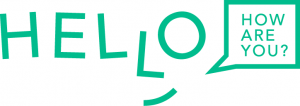By Chelsey Anseeuw and Emily Lennon, Social Planners at the City of Edmonton

Have you ever found yourself passing by a coworker or chatting with a friend and asking “how are you?”, but not really expecting an honest answer? Most of the time we reply “fine” or “okay, how are you?”, not expecting the truth of it all.
The Canadian Mental Health Association (CMHA) wants Canadians to #GetReal during Mental Health Week (May 4-10) and say more than just “I’m fine.” Let’s talk about how we really feel in conversations with friends, neighbours and coworkers.
Even before COVID-19, loneliness and social isolation were already major concerns in our society. People with few social connections are at increased risk of anxiety, depression and suicidal behaviours. This was the reason the City’s Urban Isolation and Mental Health Council Initiative launched “Hello, How Are You?” — a public awareness campaign encouraging Edmontonians to get connected to their communities to help prevent social isolation. Projects initiated through the campaign, to promote social connectedness, include: Buddy Benches, the Hello, How Are You? Board Game, and Hello, Let’s Eat!

“Right now more than ever it is so important to reach out to those around you and stay connected,” says Ione Challborn, Executive Director, CMHA Edmonton. “Self-isolating does not mean having to socially isolate, and it is vital to keep an individual’s social networks open while respecting local guidelines regarding physical distancing.”
Whether you’re a senior living alone, a healthcare worker on the front lines, a parent homeschooling your kids, a small business owner or someone struggling with the financial pressures of recent events, we all feel the effects of this pandemic in different ways. We are in this together and we can start supporting each other by asking “how are you?” and really meaning it. Phone calls and video chats offer excellent opportunities to connect, even when we can’t be in the same room.
For some, social support offered by a friend or family member may not be enough. Mental health services and supports are available for those who need extra help. While in-person services are very limited due to physical distancing requirements, many mental health providers have maintained accessibility by transitioning to phone and video conference services.
“We all need to talk through things sometimes, and especially in our current climate it is important to listen to yourself and how you are feeling,” says Sean Burr, Social Worker at the City of Edmonton.
If you would like to access mental health supports, some good places to start include:
Call:
- CMHA Edmonton Distress Line: 780-482-4357 (HELP), if you or someone you know is in distress.
- 211 for information on a range of community services and supports.
- Alberta Health Services Mental Health Help Line: 1-877-303-2642, for confidential support for mental health concerns.
Visit:
- Help in Tough Times (Alberta Health Services)
- Canadian Mental Health Association, Edmonton Region Supports
To learn more about the City’s Urban Isolation & Mental Health Initiative, visit edmonton.ca/hello.
Explore mentalhealthweek.ca for more information and resources on CMHA Mental Health Week.


Add a comment to: Mental Health Week: Get Real with How You Feel